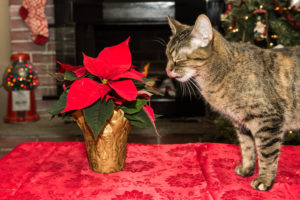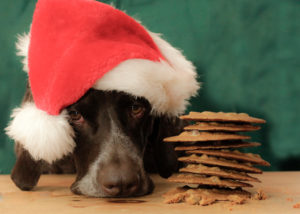By: Cynthia Quezada, DVM
The holidays are a time of family, friends, giving, and joy. The holidays can also be a very stressful time especially with our busy schedules. In all the excitement and rush to greet the New Year, we may not think about potential dangers that our pets may be exposed to during this time. To help keep your pets safe during the holiday season, here are the most common toxins to be aware of.
Plants:
 Toxic plants that are commonly around during this time of year include lilies, daffodils, holly berries, mistletoe, and Christmas trees. Lilies are the most toxic on the list, as they can cause sudden kidney failure if any of the plant material is ingested. Daffodils are also considered highly toxic. Ingestion of the plant (especially the bulb) can result in vomiting, diarrhea, abdominal pain, cardiac arrhythmias, convulsions, and hypertension (a low blood pressure). If your dog or cat ingests even a small amount of lily or daffodil plant material, it is important to seek immediate veterinary care for your pet. Mistletoe and holly berries are considered moderately toxic. Ingestion of these plants can cause excessive drooling, vomiting and diarrhea. The fir tree oils found in Christmas trees, although not life-threatening, can also make your pet very sick if ingested. Most pets will experience excessive drooling and severe gastrointestinal upset if the tree needles are chewed on or swallowed.
Toxic plants that are commonly around during this time of year include lilies, daffodils, holly berries, mistletoe, and Christmas trees. Lilies are the most toxic on the list, as they can cause sudden kidney failure if any of the plant material is ingested. Daffodils are also considered highly toxic. Ingestion of the plant (especially the bulb) can result in vomiting, diarrhea, abdominal pain, cardiac arrhythmias, convulsions, and hypertension (a low blood pressure). If your dog or cat ingests even a small amount of lily or daffodil plant material, it is important to seek immediate veterinary care for your pet. Mistletoe and holly berries are considered moderately toxic. Ingestion of these plants can cause excessive drooling, vomiting and diarrhea. The fir tree oils found in Christmas trees, although not life-threatening, can also make your pet very sick if ingested. Most pets will experience excessive drooling and severe gastrointestinal upset if the tree needles are chewed on or swallowed.
Foods:
 Xylitol is an artificial sweetener found in many sugar-free human food items including gum, mints, candy, and other sweets. Dogs and cats metabolize xylitol differently than humans. In pets, xylitol triggers a large release of insulin causing a pet’s blood sugar to drop to very low levels. This drop in blood sugar (hypoglycemia) can cause lethargy, unsteadiness, vomiting, and in severe cases seizures. Grapes, raisins, and currants used in many sweets, desserts, trail mixes, bagels, grape juice, and other holiday recipes are also considered highly toxic. If ingested, these foods can cause kidney failure in both dogs and cats. The reason why these fruits are poisonous to pets is unknown and their toxicity does not appear to be dose dependent. In some pets a single grape can be toxic. While others need to ingest many before they are affected. Even grape seed oil is considered toxic. Macadamia nuts are another food toxic to pets in which the mechanism of toxicity is not known. Ingestion of these nuts can cause incoordination, lethargy, vomiting, muscle tremors, hyperthermia (an elevated body temperature), weakness, and tachycardia (an elevated heart rate) in pets. Other food items that are commonly found this time of year are those containing chocolate. Chocolate contains two chemical compounds that are known to be toxic to pets: theobromine and caffeine. Ingestion of very small amounts of theobromine and caffeine is usually not toxic to pets. However, if ingested in moderate amounts pets can begin to show signs of toxicity. These include restlessness, hyperactivity, vomiting, tachycardia (an elevated heart rate), hypertension (an elevated blood pressure), arrhythmias (irregular heart rate), muscle tremors, hyperthermia (an elevated body temperature), seizures, and even death. Desserts and sweets made with chocolate are not the only temptation for pets that contain caffeine. Other products that may contain caffeine include coffee, coffee grounds, tea bags, energy drinks, diet pills, and other supplements.
Xylitol is an artificial sweetener found in many sugar-free human food items including gum, mints, candy, and other sweets. Dogs and cats metabolize xylitol differently than humans. In pets, xylitol triggers a large release of insulin causing a pet’s blood sugar to drop to very low levels. This drop in blood sugar (hypoglycemia) can cause lethargy, unsteadiness, vomiting, and in severe cases seizures. Grapes, raisins, and currants used in many sweets, desserts, trail mixes, bagels, grape juice, and other holiday recipes are also considered highly toxic. If ingested, these foods can cause kidney failure in both dogs and cats. The reason why these fruits are poisonous to pets is unknown and their toxicity does not appear to be dose dependent. In some pets a single grape can be toxic. While others need to ingest many before they are affected. Even grape seed oil is considered toxic. Macadamia nuts are another food toxic to pets in which the mechanism of toxicity is not known. Ingestion of these nuts can cause incoordination, lethargy, vomiting, muscle tremors, hyperthermia (an elevated body temperature), weakness, and tachycardia (an elevated heart rate) in pets. Other food items that are commonly found this time of year are those containing chocolate. Chocolate contains two chemical compounds that are known to be toxic to pets: theobromine and caffeine. Ingestion of very small amounts of theobromine and caffeine is usually not toxic to pets. However, if ingested in moderate amounts pets can begin to show signs of toxicity. These include restlessness, hyperactivity, vomiting, tachycardia (an elevated heart rate), hypertension (an elevated blood pressure), arrhythmias (irregular heart rate), muscle tremors, hyperthermia (an elevated body temperature), seizures, and even death. Desserts and sweets made with chocolate are not the only temptation for pets that contain caffeine. Other products that may contain caffeine include coffee, coffee grounds, tea bags, energy drinks, diet pills, and other supplements.
Other Toxins and Hazards:
 Ethylene-glycol is a toxic chemical that, if ingested, is potentially fatal to both dogs and cats. Ethylene glycol is not only what makes up anti-freeze, but can also be found in some imported snow globes. Spills must be cleaned up immediately as ingestion of even the smallest amount by dogs or cats can cause acute and severe kidney failure. Liquid potpourri is another unsuspecting danger for pets, especially cats. Contact with liquid potpourri can cause serious injuries such as chemical burns to the mouth, skin, and eyes. It is best not to have any of these oils in the house if you have pets. Other hazards that are not necessarily toxic but that can pose serious health risks are tinsel, string, and ribbon. If swallowed, they can cause severe mechanical injuries to the gastrointestinal tract. This is what is referred to as a linear foreign body and surgery to remove the material is usually required. Prevention is always the best medicine. So it is best to keep these materials out of your pet’s reach.
Ethylene-glycol is a toxic chemical that, if ingested, is potentially fatal to both dogs and cats. Ethylene glycol is not only what makes up anti-freeze, but can also be found in some imported snow globes. Spills must be cleaned up immediately as ingestion of even the smallest amount by dogs or cats can cause acute and severe kidney failure. Liquid potpourri is another unsuspecting danger for pets, especially cats. Contact with liquid potpourri can cause serious injuries such as chemical burns to the mouth, skin, and eyes. It is best not to have any of these oils in the house if you have pets. Other hazards that are not necessarily toxic but that can pose serious health risks are tinsel, string, and ribbon. If swallowed, they can cause severe mechanical injuries to the gastrointestinal tract. This is what is referred to as a linear foreign body and surgery to remove the material is usually required. Prevention is always the best medicine. So it is best to keep these materials out of your pet’s reach.
If you have any questions or think that your pet has been exposed to any poisonous substances please call our office at (310) 478-5915. Another good resource is the ASPCA Animal Poison Control Center. Their call center is available 24 hours a day , 365 days a year at (888) 426-4435.
We hope that this information was helpful. West LA Veterinary Group wishes you and your pet a safe and joyous holiday. Happy New Year!
